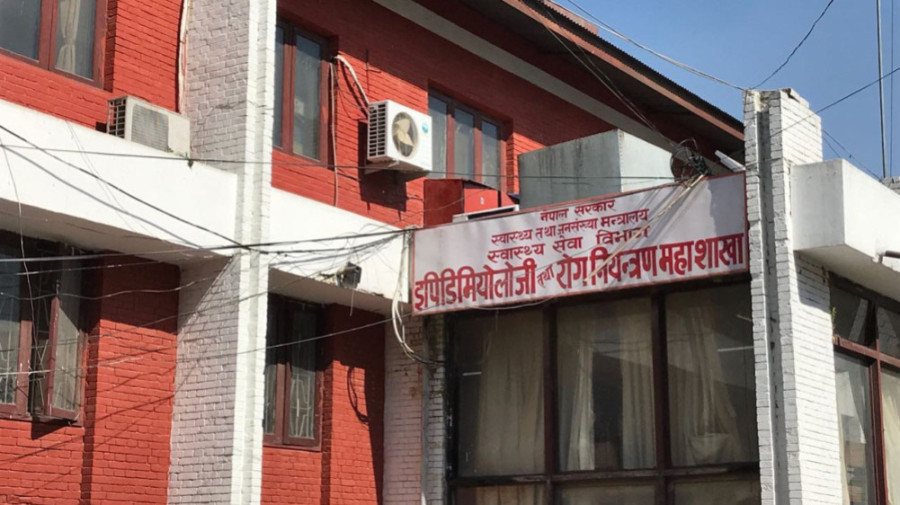Health
Cholera outbreaks being reported only from districts with active surveillance
Active surveillance of cholera is being carried out in only four districts only—the Valley’s three and Kailali. Experts say water and sanitation conditions in the rest of the districts are poor as well.
Arjun Poudel
At least 20 diarrhoeal patients—12 from Lalitpur, eight from Kailali and two from Kathmandu—were found to have contracted cholera recently.
People residing in other districts may have also been infected with the deadly disease, but due to absence of an active cholera surveillance programme in most of the districts, no one knows what is going on.
“Active cholera surveillance is being carried out only in the three districts of the Valley—Kathmandu, Lalitpur and Bhaktapur—and in Kailali,” said Dr Hemanta Chandra Ojha, an official at the Epidemiology and Disease Control Division. “We have a system in place in other districts as well but intensive surveillance is being carried out in Kathmandu Valley and in Kailali only.”
Cholera is a highly infectious disease that causes severe diarrhoea and vomiting, which in turn results in dehydration and can lead to death within a few hours if left untreated. The World Health Organisation says cholera is a global threat to public health and an indicator of inequality and a lack of social development.
Health officials said that the Vibrio cholera 01 Ogawa serotype has been confirmed in the stool samples of the infected patients. They concede that the outbreaks of the deadly disease are being reported from the districts having active case surveillance programmes. Active cholera surveillance is being carried out from 27 health facilities in the Valley and 10 in Kailali district.
“Report of cholera outbreak in districts having intensive cholera surveillance is an obvious thing, as we carry out testing only when we find problems,” said an official at the Department of Health Services, asking not to be named as he is not authorised to talk to the media. “We will not know anything about the cause of disease outbreaks, if we stopped testing.”
Officials at the Ministry of Health and Population, however, claimed that even if active cholera surveillance programmes are not in place in most of the districts, systems are in place to collect stool samples of the diarrhoeal patients and send them for lab testing if needed.
“We have provincial public health laboratories in all provinces that can carry out cholera testing, and we also bring samples to the National Public Health Laboratory for examination when a massive diarrheal outbreak occurs,” said Ojha of the Epidemiology and Disease Control Division. “We have an Integrated Health Information Management System and Early Warning, Alert and Response System, which reports about the disease outbreaks. Active surveillance is being carried out only in high risk districts.”
Officials, who wish not to be quoted in news as they fear retribution for speaking to the media, however, said that Integrated Health Information Management System only provides monthly reports; moreover, the system provides only clinical reports, not the reports of lab testing. The Early Warning, Alert and Response System is also not very effective.
“The thing is systems on which health authorities rely much do not give an exact picture of the disease outbreak, and such systems do not help contain massive outbreaks,” the official said. “Major outbreaks of waterborne disease could happen at any time and at any place, and authorities concerned get alerted only after loss.”
Health officials concede that it is not the government that is carrying out active surveillance of the deadly disease in four districts but the International Vaccine Institute, Korea. When asked why the government does not think it necessary to carry out active cholera surveillance in other districts, they said that the existing health budget is insufficient for the task.
Cholera outbreaks during the monsoon season are not a new thing in Nepal, as hundreds of people throughout the country suffer from diarrhoeal infections that continue for months every year and scores contract the disease.
In 2022, a total of 77 cholera cases were confirmed in the Valley. Last year, health authorities administered an oral cholera vaccine in Kathmandu Metropolitan City’s wards 11, 12, and 13, which were highly affected by the outbreak.
Public health experts say that due to poor sanitation and hygiene conditions, the country as a whole is highly vulnerable to water-borne illnesses including diarrhoea, dysentery, typhoid, hepatitis, and cholera, with thousands of people getting infected every year.
They say sheer negligence from authorities concerned is responsible for ongoing outbreak of diarrhoeal diseases including the deadly cholera.
Health authorities in most local units had stopped the testing of drinking water just before the start of the monsoon season, citing lack of funds, although deadly microbes such as faecal coliform and E coli were frequently detected in drinking water samples.
Faecal coliform and E coli, both microscopic organisms, are found in human faeces. According to doctors, the presence of faecal coliform and E coli in drinking water means it is contaminated with sewage.
Doctors say bottled water, which is widely used by households and offices in Kathmandu Valley, is generally considered safe, but water quality of several companies have been found questionable. Dangerous microbes are detected in bottled water every year, which means not all jar water brands are safe to drink without treatment.
Doctors have asked authorities to launch awareness drives against water-borne diseases and ensure safe drinking water to prevent deaths from illnesses like cholera.
To contain the spread of the infection, a combination of careful surveys, ensuring safe drinking water, maintaining sanitation and hygiene, social mobilisation, and treatment is required, according to doctors.
The World Health Organisation also said that a multifaceted approach is key to controlling cholera and reducing deaths.




 9.12°C Kathmandu
9.12°C Kathmandu














